Famous Short Poems

| Enjoy these
everlasting short poems from some of our most famous poets. |
| Refusal Beloved, In what other lives or lands Have I known your lips Your Hands Your Laughter brave Irreverent. Those sweet excesses that I do adore. What surety is there That we will meet again, On other worlds some Future time undated. I defy my body's haste. Without the promise Of one more sweet encounter I will not deign to die. by Maya Angelou |
| The
Lesson I keep on dying again. Veins collapse, opening like the Small fists of sleeping Children. Memory of old tombs, Rotting flesh and worms do Not convince me against The challenge. The years And cold defeat live deep in Lines along my face. They dull my eyes, yet I keep on dying, Because I love to live. by Maya Angelou |
| When
You Come When you come to me, unbidden, Beckoning me To long-ago rooms, Where memories lie. Offering me, as to a child, an attic, Gatherings of days too few. Baubles of stolen kisses. Trinkets of borrowed loves. Trunks of secret words, I CRY. by Maya Angelou |
| Passing
Time Your skin like dawn Mine like musk One paints the beginning of a certain end. The other, the end of a sure beginning. by Maya Angelou |
| A
Conceit Give me your hand Make room for me to lead and follow you beyond this rage of poetry. Let others have the privacy of touching words and love of loss of love. For me Give me your hand. by Maya Angelou |
| Insomniac There are some nights when sleep plays coy, aloof and disdainful. And all the wiles that I employ to win its service to my side are useless as wounded pride, and much more painful. by Maya Angelou |
| Sonnet
80: "O! how I faint when I of you do write,..." O! how I faint when I of you do write, Knowing a better spirit doth use your name, And in the praise thereof spends all his might, To make me tongue-tied speaking of your fame. But since your worth, wide as the ocean is, The humble as the proudest sail doth bear, My saucy bark, inferior far to his, On your broad main doth wilfully appear. Your shallowest help will hold me up afloat, Whilst he upon your soundless deep doth ride; Or, being wrack'd, I am a worthless boat, He of tall building, and of goodly pride: Then if he thrive and I be cast away, The worst was this, my love was my decay. by William Shakespeare |
| Sonnet
138: "When my love swears that she is made of truth,..." When my love swears that she is made of truth, I do believe her though I know she lies, That she might think me some untutored youth, Unlearned in the world's false subtleties. Thus vainly thinking that she thinks me young, Although she knows my days are past the best, Simply I credit her false-speaking tongue: On both sides thus is simple truth suppressed: But wherefore says she not she is unjust? And wherefore say not I that I am old? O! love's best habit is in seeming trust, And age in love, loves not to have years told: Therefore I lie with her, and she with me, And in our faults by lies we flattered be. by William Shakespeare |
| Sonnet
31: “Thy bosom is endeared with all hearts…” Thy bosom is endeared with all hearts, Which I by lacking have supposed dead, And there reigns love and all love's loving parts, And all those friends which I thought buried. How many a holy and obsequious tear Hath dear religious love stol'n from mine eye, As interest of the dead, which now appear, But things removed that hidden in thee lie. Thou art the grave where buried love doth live, Hung with the trophies of my lovers gone, Who all their parts of me to thee did give, That due of many, now is thine alone. Their images I loved, I view in thee, And thou (all they) hast all the all of me. by William Shakespeare |
| How
Like A Winter Hath My Absence Been How like a winter hath my absence been From Thee, the pleasure of the fleeting year! What freezings have I felt; what dark days seen, What old December's bareness everywhere! And yet this time removed was summer's time: The teeming autumn big with rich increase, Bearing the wanton burden of the prime Like widow'd wombs after their lords' decease; Yet this abundant issue seem'd to me But hope of orphans, and unfather'd fruit; For summer and his pleasures wait on thee, And, thou away, the very birds are more; Or if they sing, 'tis with so dull a cheer, That leaves look pale, dreading the winter's near. by William Shakespeare |
| Sonnet
55: "Not marble, nor the gilded monuments..." Not marble, nor the gilded monuments Of princes shall outlive this powerful rhyme, But you shall shine more bright in these contents Than unswept stone, besmeared with ****tish time. When wasteful war shall statues overturn, And broils root out the work of masonry, Nor Mars his sword, nor war's quick fire shall burn: The living record of your memory. 'Gainst death, and all-oblivious enmity Shall you pace forth, your praise shall still find room, Even in the eyes of all posterity That wear this world out to the ending doom. So till the judgment that your self arise, You live in this, and dwell in lovers' eyes. by William Shakespeare |
| Sonnet
26: “Lord of my love, to whom in vassalage…” Lord of my love, to whom in vassalage Thy merit hath my duty strongly knit; To thee I send this written embassage To witness duty, not to show my wit. Duty so great, which wit so poor as mine May make seem bare, in wanting words to show it; But that I hope some good conceit of thine In thy soul's thought (all naked) will bestow it: Till whatsoever star that guides my moving, Points on me graciously with fair aspect, And puts apparel on my tattered loving, To show me worthy of thy sweet respect, Then may I dare to boast how I do love thee, Till then, not show my head where thou mayst prove me. by William Shakespeare |
| Sonnet
105: "Let not my love be called idolatry,..." Let not my love be called idolatry, Nor my beloved as an idol show, Since all alike my songs and praises be To one, of one, still such, and ever so. Kind is my love to-day, to-morrow kind, Still constant in a wondrous excellence; Therefore my verse to constancy confined, One thing expressing, leaves out difference. Fair, kind, and true, is all my argument, Fair, kind, and true, varying to other words; And in this change is my invention spent, Three themes in one, which wondrous scope affords. Fair, kind, and true, have often lived alone, Which three till now, never kept seat in one. by William Shakespeare |
| A
Minor Bird I have wished a bird would fly away, And not sing by my house all day; Have clapped my hands at him from the door When it seemed as if I could bear no more. The fault must partly have been in me. The bird was not to blame for his key. And of course there must be something wrong In wanting to silence any song. by Robert Frost |
| Questioning
Faces The winter owl banked just in time to pass And save herself from breaking window glass. And her wings straining suddenly aspread Caught color from the last of evening red In a display of underdown and quill To glassed-in children at the window sill. by Robert Frost |
| Blue-Butterfly
Day It is a blue-butterfly day here in spring, And with these sky-flakes down in flurry on flurry There is more unmixed color on the wing Than flowers will show for days unless they hurry. But these are flowers that fly and all but sing: And now from having ridden out desire They lie closed over in the wind and cling Where wheels have freshly sliced the April mire. by Robert Frost |
| Acceptance When the spent sun throws up its rays on cloud And goes down burning into the gulf below, No voice in nature is heard to cry aloud At what has happened. Birds, at least must know It is the change to darkness in the sky. Murmuring something quiet in her breast, One bird begins to close a faded eye; Or overtaken too far from his nest, Hurrying low above the grove, some waif Swoops just in time to his remembered tree. At most he thinks or twitters softly, 'Safe! Now let the night be dark for all of me. Let the night bee too dark for me to see Into the future. Let what will be, be.' by Robert Frost |
| What
Fifty Said.. When I was young my teachers were the old. I gave up fire for form till I was cold. I suffered like a metal being cast. I went to school to age to learn the past. Now when I am old my teachers are the young. What can't be molded must be cracked and sprung. I strain at lessons fit to start a suture. I got to school to youth to learn the future. by Robert Frost |
| The
Oft-Repeated Dream She had no saying dark enough For the dark pine that kept Forever trying the window latch Of the room where they slept. The tireless but ineffectual hands That with every futile pass Made the great tree seem as a little bird Before the mystery of glass! It never had been inside the room, And only one of the two Was afraid in an oft-repeated dream Of what the tree might do. by Robert Frost |
| Storm
Fear When the wind works against us in the dark, And pelts with snow The lowest chamber window on the east, And whispers with a sort of stifled bark, The beast, 'Come out! Come out!'— It costs no inward struggle not to go, Ah, no! I count our strength, Two and a child, Those of us not asleep subdued to mark How the cold creeps as the fire dies at length,— How drifts are piled, Dooryard and road ungraded, Till even the comforting barn grows far away And my heart owns a doubt Whether 'tis in us to arise with day And save ourselves unaided. by Robert Frost |
| Blueberries Blueberries as big as the end of your thumb, Real sky-blue, and heavy, and ready to drum In the cavernous pail of the first one to come! And all ripe together, not some of them green And some of them ripe! You ought to have seen! by Robert Frost |
| Design I found a dimpled spider, fat and white, On a white heal-all, holding up a moth Like a white piece of rigid satin cloth — Assorted characters of death and blight Mixed ready to begin the morning right, Like the ingredients of a witches' broth — A snow-drop spider, a flower like a froth, And dead wings carried like a paper kite. What had that flower to do with being white, The wayside blue and innocent heal-all? What brought the kindred spider to that height, Then steered the white moth thither in the night? What but design of darkness to appall?— If design govern in a thing so small. by Robert Frost |
| A
Late Walk When I go up through the mowing field, The headless aftermath, Smooth-laid like thatch with the heavy dew, Half closes the garden path. And when I come to the garden ground, The whir of sober birds Up from the tangle of withered weeds Is sadder than any words A tree beside the wall stands bare, But a leaf that lingered brown, Disturbed, I doubt not, by my thought, Comes softly rattling down. I end not far from my going forth By picking the faded blue Of the last remaining aster flower To carry again to you. by Robert Frost |
| A
Boundless Moment He halted in the wind, and — what was that Far in the maples, pale, but not a ghost? He stood there bringing March against his thought, And yet too ready to believe the most. "Oh, that's the Paradise-in-bloom," I said; And truly it was fair enough for flowers had we but in us to assume in march Such white luxuriance of May for ours. We stood a moment so in a strange world, Myself as one his own pretense deceives; And then I said the truth (and we moved on). A young beech clinging to its last year's leaves. by Robert Frost |
| Devotion The heart can think of no devotion Greater than being shore to ocean - Holding the curve of one position, Counting an endless repetition. by Robert Frost |
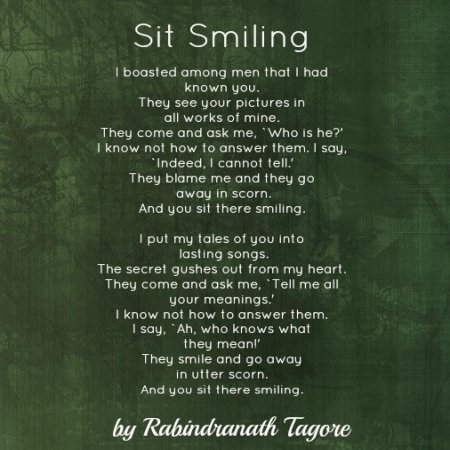
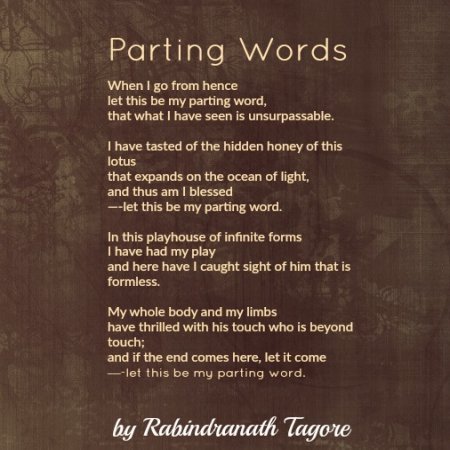
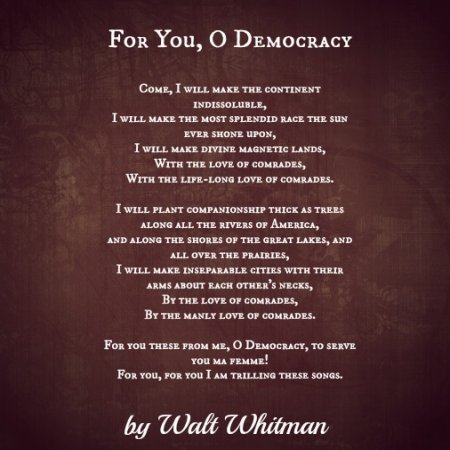
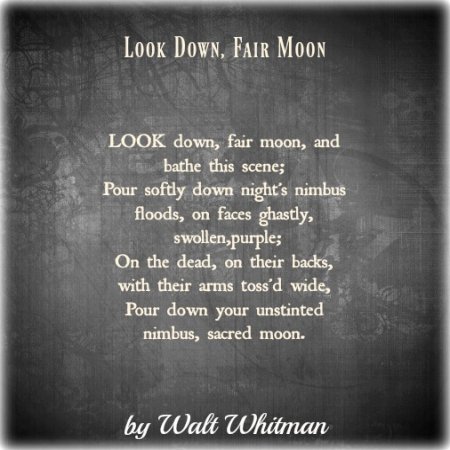
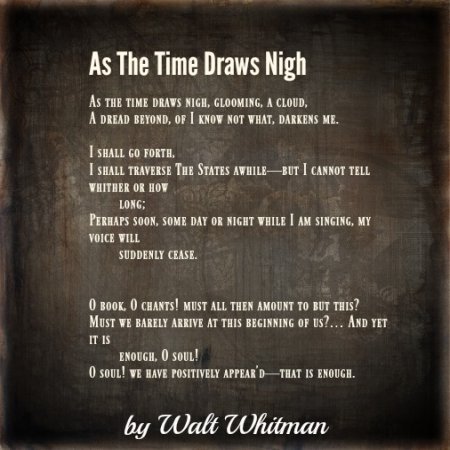
| Love,
We're Going Home Now Love, we're going home now, Where the vines clamber over the trellis: Even before you, the summer will arrive, On its honeysuckle feet, in your bedroom. Our nomadic kisses wandered over all the world: Armenia, dollop of disinterred honey: Ceylon, green dove: and the YangTse with its old Old patience, dividing the day from the night. And now, dearest, we return, across the crackling sea Like two blind birds to their wall, To their nest in a distant spring: Because love cannot always fly without resting, Our lives return to the wall, to the rocks of the sea: Our kisses head back home where they belong. by Pablo Neruda |
| ‘Perhaps
not to be is to be without your being.’ Perhaps not to be is to be without your being, without your going, that cuts noon light like a blue flower, without your passing later through fog and stones, without the torch you lift in your hand that others may not see as golden, that perhaps no one believed blossomed the glowing origin of the rose, without, in the end, your being, your coming suddenly, inspiringly, to know my life, blaze of the rose-tree, wheat of the breeze: and it follows that I am, because you are: it follows from ‘you are’, that I am, and we: and, because of love, you will, I will, We will, come to be. by Pablo Neruda |
| Absence I have scarcely left you When you go in me, crystalline, Or trembling, Or uneasy, wounded by me Or overwhelmed with love, as when your eyes Close upon the gift of life That without cease I give you. My love, We have found each other Thirsty and we have Drunk up all the water and the Blood, We found each other Hungry And we bit each other As fire bites, Leaving wounds in us. But wait for me, Keep for me your sweetness. I will give you too A rose. by Pablo Neruda |
| ‘March
days return with their covert light’ March days return with their covert light, and huge fish swim through the sky, vague earthly vapours progress in secret, things slip to silence one by one. Through fortuity, at this crisis of errant skies, you reunite the lives of the sea to that of fire, grey lurchings of the ship of winter to the form that love carved in the guitar. O love, O rose soaked by mermaids and spume, dancing flame that climbs the invisible stairway, to waken the blood in insomnia’s labyrinth, so that the waves can complete themselves in the sky, the sea forget its cargoes and rages, and the world fall into darkness’s nets. by Pablo Neruda |
| ‘In
the wave-strike over unquiet stones’ In the wave-strike over unquiet stones the brightness bursts and bears the rose and the ring of water contracts to a cluster to one drop of azure brine that falls. O magnolia radiance breaking in spume, magnetic voyager whose death flowers and returns, eternal, to being and nothingness: shattered brine, dazzling leap of the ocean. Merged, you and I, my love, seal the silence while the sea destroys its continual forms, collapses its turrets of wildness and whiteness, because in the weft of those unseen garments of headlong water, and perpetual sand, we bear the sole, relentless tenderness. by Pablo Neruda |
| The
Eighth of September This day, Today, was a brimming glass. This day, Today, was an immense wave. This day was all the Earth. This day, the storm-driven ocean lifted us up in a kiss so exalted we trembled at the lightning flash and bound as one, fell, and drowned, without being unbound. This day our bodies grew stretched out to Earth’s limits, orbited there, melded there to one globe of wax, or a meteor’s flame. A strange door opened, between us, and someone, with no face as yet,waited for us there. by Pablo Neruda |
| If
I can stop one Heart from breaking If I can stop one Heart from breaking, I shall not live in vain If I can ease one Life the Aching, Or cool one Pain, Or help one fainting Robin Unto his Nest again, I shall not live in vain. by Emily Dickinson |
| Mine
Enemy is growing old Mine Enemy is growing old - I have at last Revenge - The Palate of the Hate departs - If any would avenge Let him be quick - The Viand flits - It is a faded Meat - Anger as soon as fed - is dead - 'Tis Starving makes it fat - by Emily Dickinson |
| Luck
is not chance Luck is not chance - It's Toil - Fortune's expensive smile Is earned - The Father of the Mine Is that old fashioned Coin We spurned - by Emily Dickinson |
| A
lane of Yellow led the eye A lane of Yellow led the eye Unto a Purple Wood Whose soft inhabitants to be Surpasses solitude If Bird the silence contradict Or flower presume to show In that low summer of the West Impossible to know - by Emily Dickinson |
| I've
seen a Dying Eye I've seen a Dying Eye Run round and round a Room -- In search of Something -- as it seemed -- Then Cloudier become -- And then -- obscure with Fog -- And then -- be soldered down Without disclosing what it be 'Twere blessed to have seen -- by Emily Dickinson |
| There
is no Frigate like a Book There is no Frigate like a Book To take us Lands away Nor any Coursers like a Page Of prancing Poetry – This Traverse may the poorest take Without oppress of Toll – How frugal is the Chariot That bears a Human soul. by Emily Dickinson |
| Wild
Nights! Wild Nights! Wild Nights - Wild Nights! Were I with thee Wild Nights should be Our luxury! Futile - the Winds - To a Heart in port - Done with the Compass - Done with the Chart! Rowing in Eden - Ah, the Sea! Might I but moor - Tonight - In Thee! by Emily Dickinson |
| For
each ecstatic instant For each ecstatic instant We must an anguish pay In keen and quivering ratio To the Ecstasy. For each beloved hour Sharp pittances of years, Bitter contested farthings And coffers heaped with tears. by Emily Dickinson |
| Perhaps
I Asked Too Large Perhaps I asked too large — I take — no less than skies — For Earths, grow thick as Berries, in my native town — My Basked holds — just — Firmaments — Those — dangle easy — on my arm, But smaller bundles — Cram. by Emily Dickinson |
| This
is My Letter to the World This is my letter to the World That never wrote to Me — The simple News that Nature told — With tender Majesty Her Message is committed To Hands I cannot see — For love of Her — Sweet — countrymen — Judge tenderly — of Me by Emily Dickinson |
| I
stepped from plank to plank I stepped from plank to plank So slow and cautiously; The stars about my head I felt, About my feet the sea. I knew not but the next Would be my final inch,— This gave me that precarious gait Some call experience. by Emily Dickinson |
| Before
you thought of spring, Before you thought of spring, Except as a surmise, You see, God bless his suddenness, A fellow in the skies Of independent hues, A little weather-worn, Inspiriting habiliments Of indigo and brown. With specimens of song, As if for you to choose, Discretion in the interval, With gay delays he goes To some superior tree Without a single leaf, And shouts for joy to nobody But his seraphic self! by Emily Dickinson |
| There
came a Wind like a Bugle There cam a Wind like a Bugle - It quivered through the Grass And a Green Chill upon the Heat So ominous did pass We barred the Windows and the Doors As from an Emerald Ghost - The Doom's electric Moccasin The very instant passed - On a strange Mob of panting Trees And Fences fled away And Rivers where the Houses ran Those looked that lived - that Day - The Bell within the steeple wild The flying tidings told - How much can come And much can go, And yet abide the World! by Emily Dickinson |
| Cat She sights a Bird — she chuckles — She flattens — then she crawls — She runs without the look of feet — Her eyes increase to Balls — Her Jaws stir — twitching — hungry — Her Teeth can hardly stand — She leaps, but Robin leaped the first — Ah, ****, of the Sand, The Hopes so juicy ripening — You almost bathed your Tongue — When Bliss disclosed a hundred Toes — And fled with every one — by Emily Dickinson |
Split the Lark - and you'll find the Music Split the Lark — and you'll find the Music — Bulb after Bulb, in Silver rolled — Scantilly dealt to the Summer Morning Saved for your Ear when Lutes be old. Loose the Flood — you shall find it patent — Gush after Gush, reserved for you — Scarlet Experiment! Sceptic Thomas! Now, do you doubt that your Bird was true? by Emily Dickinson |
| It's
like the light, -- It's like the light, — A fashionless delight It's like the bee, — A dateless melody. It's like the woods, Private like breeze, Phraseless, yet it stirs The proudest trees. It's like the morning, — Best when it's done, — The everlasting clocks Chime noon. by Emily Dickinson |
| Good
night! which put the candle out? Good night! which put the candle out? A jealous zephyr, not a doubt. Ah! friend, you little knew How long at that celestial wick The angels labored diligent; Extinguished, now, for you! It might have been the lighthouse spark Some sailor, rowing in the dark, Had importuned to see! It might have been the waning lamp That lit the drummer from the camp To purer reveille! by Emily Dickinson |
| Victory
comes late, Victory comes late, And is held low to freezing lips Too rapt with frost To take it. How sweet it would have tasted, Just a drop! Was God so economical? His table's spread too high for us Unless we dine on tip-toe. Crumbs fit such little mouths, Cherries suit robins; The eagle's golden breakfast Strangles them. God keeps his oath to sparrows, Who of little love Know how to starve! by Emily Dickinson |
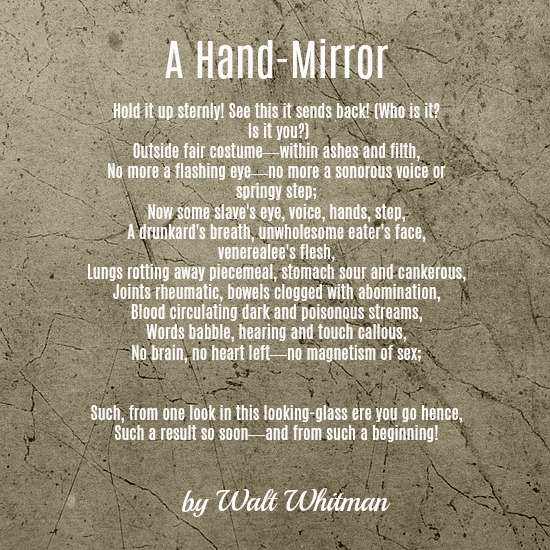
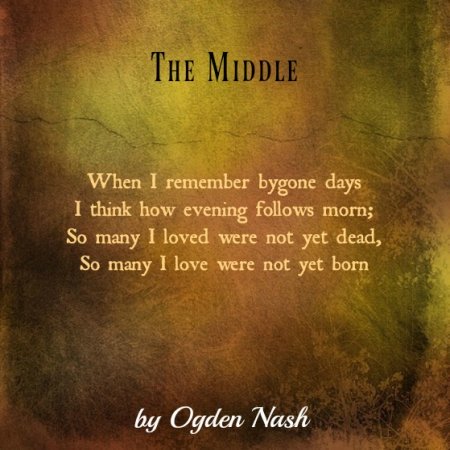
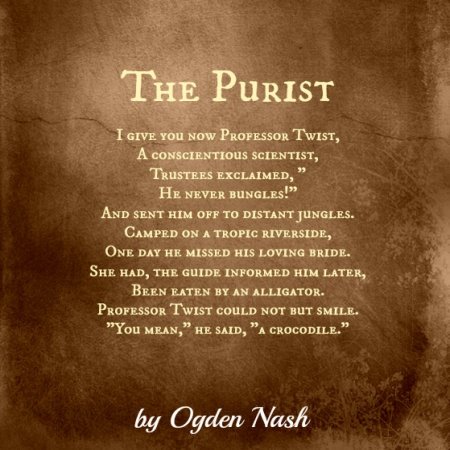
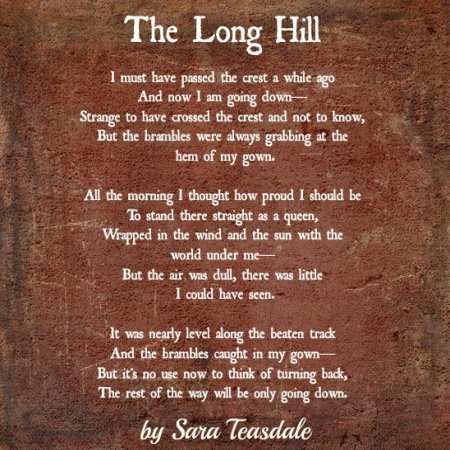
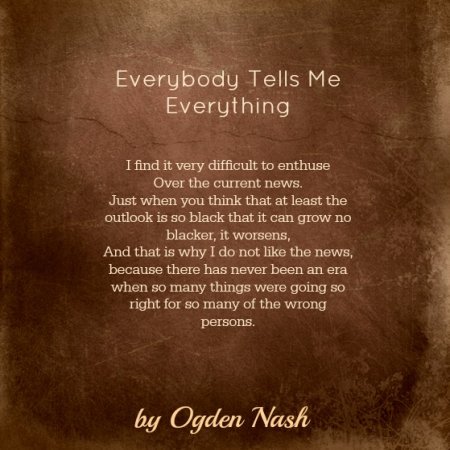
| "Brave
Schill! By Death Delivered" BRAVE Schill! by death delivered, take thy flight From Prussia's timid region. Go, and rest With heroes, 'mid the islands of the Blest, Or in the fields of empyrean light. A meteor wert thou crossing a dark night: Yet shall thy name, conspicuous and sublime, Stand in the spacious firmament of time, Fixed as a star: such glory is thy right. Alas! it may not be: for earthly fame Is Fortune's frail dependant; yet there lives A Judge, who, as man claims by merit, gives; To whose all-pondering mind a noble aim, Faithfully kept, is as a noble deed; In whose pure sight all virtue doth succeed. by William Wordsworth |
| "Behold
Vale! I Said, When I Shall Con" "Beloved Vale!" I said, "when I shall con Those many records of my childish years, Remembrance of myself and of my peers Will press me down: to think of what is gone Will be an awful thought, if life have one." But, when into the Vale I came, no fears Distressed me; from mine eyes escaped no tears; Deep thought, or dread remembrance, had I none. By doubts and thousand petty fancies crost I stood, of simple shame the blushing Thrall; So narrow seemed the brooks, the fields so small! A Juggler's balls old Time about him tossed; I looked, I stared, I smiled, I laughed; and all The weight of sadness was in wonder lost. by William Wordsworth |
| "Brook!
Whose Society The Poet Seeks" Brook! whose society the Poet seeks, Intent his wasted spirits to renew; And whom the curious Painter doth pursue Through rocky passes, among flowery creeks, And tracks thee dancing down thy water-breaks; If wish were mine some type of thee to view, Thee, and not thee thyself, I would not do Like Grecian Artists, give thee human cheeks, Channels for tears; no Naiad should'st thou be,— Have neither limbs, feet, feathers, joints nor hairs: It seems the Eternal Soul is clothed in thee With purer robes than those of flesh and blood, And hath bestowed on thee a safer good; Unwearied joy, and life without its cares. by William Wordsworth |
| Admonition WELL may'st thou halt—and gaze with brightening eye! The lovely Cottage in the guardian nook Hath stirred thee deeply; with its own dear brook, Its own small pasture, almost its own sky! But covet not the Abode;—forbear to sigh, As many do, repining while they look; Intruders—who would tear from Nature's book This precious leaf, with harsh impiety. Think what the home must be if it were thine, Even thine, though few thy wants!—Roof, window, door, The very flowers are sacred to the Poor, The roses to the porch which they entwine: Yea, all, that now enchants thee, from the day On which it should be touched, would melt away. by William Wordsworth |
| Bothwell
Castle Immured in Bothwell's Towers, at times the Brave (So beautiful is the Clyde) forgot to mourn The liberty they lost at Bannockburn. Once on those steeps I roamed at large, and have In mind the landscape, as if still in sight; The river glides, the woods before me wave; But, by occasion tempted, now I crave Needless renewal of an old delight. Better to thank a dear and long-past day For joy its sunny hours were free to give Than blame the present, that our wish hath crost. Memory, like Sleep, hath powers which dreams obey, Dreams, vivid dreams, that are not fugitive; How little that she cherishes is lost! by William Wordsworth |
| Anticipation,
October 1803 SHOUT, for a mighty Victory is won! On British ground the Invaders are laid low; The breath of Heaven has drifted them like snow, And left them lying in the silent sun, Never to rise again!—the work is done. Come forth, ye old men, now in peaceful show And greet your sons! drums beat and trumpets blow! Make merry, wives! ye little children, stun Your grandame's ears with pleasure of your noise! Clap, infants, clap your hands! Divine must be That triumph, when the very worst, the pain, And even the prospect of our brethren slain, Hath something in it which the heart enjoys:— In glory will they sleep and endless sanctity. by William Wordsworth |
| The
Eagle and the Dove SHADE of Caractacus, if spirits love The cause they fought for in their earthly home To see the Eagle ruffled by the Dove May soothe thy memory of the chains of Rome. These children claim thee for their sire; the breath Of thy renown, from Cambrian mountains, fans A flame within them that despises death And glorifies the truant youth of Vannes. With thy own scorn of tyrants they advance, But truth divine has sanctified their rage, A silver cross enchased with flowers of France Their badge, attests the holy fight they wage. The shrill defiance of the young crusade Their veteran foes mock as an idle noise; But unto Faith and Loyalty comes aid From Heaven, gigantic force to beardless boys by William Wordsworth |
| A
Night
Thought Lo! where the Moon along the sky Sails with her happy destiny; Oft is she hid from mortal eye Or dimly seen, But when the clouds asunder fly How bright her mien! Far different we—a froward race, Thousands though rich in Fortune's grace With cherished sullenness of pace Their way pursue, Ingrates who wear a smileless face The whole year through. If kindred humours e'er would make My spirit droop for drooping's sake, From Fancy following in thy wake, Bright ship of heaven! A counter impulse let me take And be forgiven. by William Wordsworth |
| The
Best Thing in the World What's the best thing in the world? June-rose, by May-dew impearled; Sweet south-wind, that means no rain; Truth, not cruel to a friend; Pleasure, not in haste to end; Beauty, not self-decked and curled Till its pride is over-plain; Love, when, so, you're loved again. What's the best thing in the world? —Something out of it, I think. by Elizabeth Barrett Browning |
| A
Thought For A Lonely Death-Bed If God compel thee to this destiny, To die alone, with none beside thy bed To ruffle round with sobs thy last word said And mark with tears the pulses ebb from thee,— Pray then alone, ' O Christ, come tenderly ! By thy forsaken Sonship in the red Drear wine-press,—by the wilderness out-spread,— And the lone garden where thine agony Fell bloody from thy brow,—by all of those Permitted desolations, comfort mine ! No earthly friend being near me, interpose No deathly angel 'twixt my face aud thine, But stoop Thyself to gather my life's rose, And smile away my mortal to Divine ! ' by Elizabeth Barrett Browning |
| The
Seraph and the Poet THE seraph sings before the manifest God-One, and in the burning of the Seven, And with the full life of consummate Heaving beneath him like a mother's Warm with her first-born's slumber in that The poet sings upon the earth grave-riven, Before the naughty world, soon self-forgiven For wronging him,—and in the darkness prest From his own soul by worldly weights. Even so, Sing, seraph with the glory ! heaven is high; Sing, poet with the sorrow ! earth is low: The universe's inward voices cry ' Amen ' to either song of joy and woe: Sing, seraph,—poet,—sing on equally ! by Elizabeth Barrett Browning |
| Sonnet
XLI: I Thank All I thank all who have loved me in their hearts, With thanks and love from mine. Deep thanks to all Who paused a little near the prison-wall To hear my music in its louder parts Ere they went onward, each one to the mart's Or temple's occupation, beyond call. But thou, who, in my voice's sink and fall When the sob took it, thy divinest Art's Own instrument didst drop down at thy foot To hearken what I said between my tears,… Instruct me how to thank thee! Oh, to shoot My soul's full meaning into future years, That they should lend it utterance, and salute Love that endures, from Life that disappears! by Elizabeth Barrett Browning |
| Sonnet
XXI: Say Over Again Say over again, and yet once over again, That thou dost love me. Though the word repeated Should seem "a cuckoo-song,"as thou dost treat it, Remember, never to the hill or plain, Valley and wood, without her cuckoo-strain Comes the fresh Spring in all her green completed. Beloved, I, amid the darkness greeted By a doubtful spirit-voice, in that doubt's pain Cry, Speak once more—thou lovest! Who can fear Too many stars, though each in heaven shall roll, Too many flowers, though each shall crown the year? Say thou dost love me, love me, love me—toll The silver iterance!—only minding, Dear, To love me also in silence with thy soul. by Elizabeth Barrett Browning |
| Sonnet
VIII: What Can I Give Thee Back What can I give thee back, O liberal And princely giver, who hast brought the gold And purple of thine heart, unstained, untold, And laid them on the outside of the wall For such as I to take or leave withal, In unexpected largesse? am I cold, Ungrateful, that for these most manifold High gifts, I render nothing back at all? Not so; not cold,—but very poor instead. Ask God who knows. For frequent tears have run The colours from my life, and left so dead And pale a stuff, it were not fitly done To give the same as pillow to thy head. Go farther! let it serve to trample on. by Elizabeth Barrett Browning |
| Sonnet
XXIV: Let the World's Sharpness Let the world's sharpness like a clasping knife Shut in upon itself and do no harm In this close hand of Love, now soft and warm, And let us hear no sound of human strife After the click of the shutting. Life to life - I lean upon thee, Dear, without alarm, And feel as safe as guarded by a charm Against the stab of worldlings, who if rife Are weak to injure. Very whitely still The lilies of our lives may reassure Their blossoms from their roots, accessible Alone to heavenly dews that drop not fewer; Growing straight, out of man's reach, on the hill. God only, who made us rich, can make us poor. by Elizabeth Barrett Browning |
| Sonnet
XLII: My Future My future will not copy fair my past - I wrote that once; and thinking at my side My ministering life-angel justified The word by his appealing look upcast To the white throne of God, I turned at last, And there, instead, saw thee, not unallied To angels in thy soul! Then I, long tried By natural ills, received the comfort fast, While budding, at thy sight, my pilgrim's staff Gave out green leaves with morning dews impearled. I seek no copy now of life's first half: Leave here the pages with long musing curled, And write me new my future's epigraph, New angel mine, unhoped for in the world! by Elizabeth Barrett Browning |
| Parting
At Morning Round the cape of a sudden came the sea, And the sun looked over the mountain's rim: And straight was a path of gold for him, And the need of a world of men for me. by Robert Browning |
| Pippa's
Song The year's at the spring, And day's at the morn; Morning's at seven; The hill-side's dew-pearl'd; The lark's on the wing; The snail's on the thorn; God's in His heaven— All's right with the world! by Robert Browning |
| Heap
Cassia, Sandal-Buds and Stripes Heap Cassia, sandal-buds and stripes Of labdanum, and aloe-balls, Smeared with dull nard an Indian wipes From out her hair: such balsam falls Down sea-side mountain pedestals, From tree-tops where tired winds are fain, Spent with the vast and howling main, To treasure half their island-gain. And strew faint sweetness from some old Egyptian's fine worm-eaten shroud Which breaks to dust when once unrolled; Or shredded perfume, like a cloud From closet long to quiet vowed, With mothed and dropping arras hung, Mouldering her lute and books among, As when a queen, long dead, was young. by Robert Browning |
| Why
I
Am a Liberal "Why?" Because all I haply can and do, All that I am now, all I hope to be,— Whence comes it save from fortune setting free Body and soul the purpose to pursue, God traced for both? If fetters, not a few, Of prejudice, convention, fall from me, These shall I bid men—each in his degree Also God-guided—bear, and gayly, too? But little do or can the best of us: That little is achieved through Liberty. Who, then, dares hold, emancipated thus, His fellow shall continue bound? Not I, Who live, love, labour freely, nor discuss A brother's right to freedom. That is "Why." by Robert Browning |
| Never
the Time and the Place Never the time and the place And the loved one all together! This path—how soft to pace! This May—what magic weather! Where is the loved one's face? In a dream that loved one's face meets mine, But the house is narrow, the place is bleak Where, outside, rain and wind combine With a furtive ear, if I strive to speak, With a hostile eye at my flushing cheek, With a malice that marks each word, each sign! O enemy sly and serpentine, Uncoil thee from the waking man! Do I hold the Past Thus firm and fast Yet doubt if the Future hold I can? This path so soft to pace shall lead Thro' the magic of May to herself indeed! Or narrow if needs the house must be, Outside are the storms and strangers: we Oh, close, safe, warm sleep I and she,— I and she! by Robert Browning |
| Earth's
Immortalities FAME. See, as the prettiest graves will do in time, Our poet's wants the freshness of its prime; Spite of the sexton's browsing horse, the sods Have struggled through its binding osier rods; Headstone and half-sunk footstone lean awry, Wanting the brick-work promised by-and-by; How the minute grey lichens, plate o'er plate, Have softened down the crisp-cut name and date! LOVE. So, the year's done with (Love me for ever!) All March begun with, April's endeavour; May-wreaths that bound me June needs must sever; Now snows fall round me, Quenching June's fever—- (Love me for ever!) by Robert Browning |
| You'll
Love Me Yet You'll love me yet!—and I can tarry Your love's protracted growing: June reared that bunch of flowers you carry From seeds of April's sowing. I plant a heartful now: some seed At least is sure to strike, And yield—what you'll not pluck indeed, Not love, but, may be, like! You'll look at least on love's remains, A grave's one violet: Your look?—that pays a thousand pains. What's death?—You'll love me yet! by Robert Browning |
| Among
The Rocks Oh, good gigantic smile o' the brown old earth, This autumn morning! How he sets his bones To bask i' the sun, and thrusts out knees and feet For the ripple to run over in its mirth; Listening the while, where on the heap of stones The white breast of the sea-lark twitters sweet. That is the doctrine, simple, ancient, true; Such is life's trial, as old earth smiles and knows. If you loved only what were worth your love, Love were clear gain, and wholly well for you: Make the low nature better by your throes! Give earth yourself, go up for gain above! by Robert Browning |
| After Take the cloak from his face, and at first Let the corpse do its worst! How he lies in his rights of a man! Death has done all death can. And, absorbed in the new life he leads, He recks not, he heeds Nor his wrong nor my vengeance; both strike On his senses alike, And are lost in the solemn and strange Surprise of the change. Ha, what avails death to erase His offence, my disgrace? I would we were boys as of old In the field, by the fold: His outrage, God's patience, man's scorn Were so easily borne! I stand here now, he lies in his place: Cover the face! by Robert Browning |
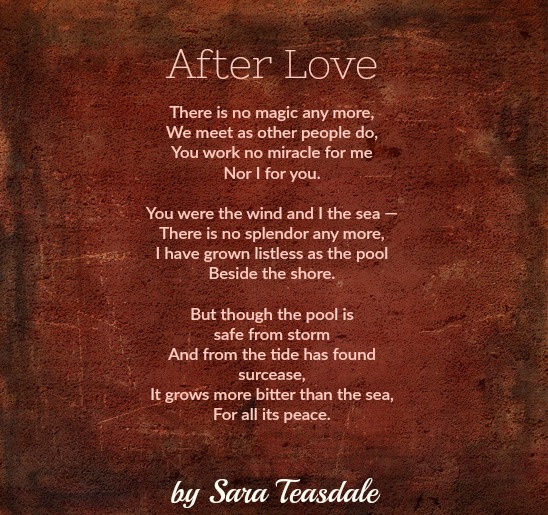
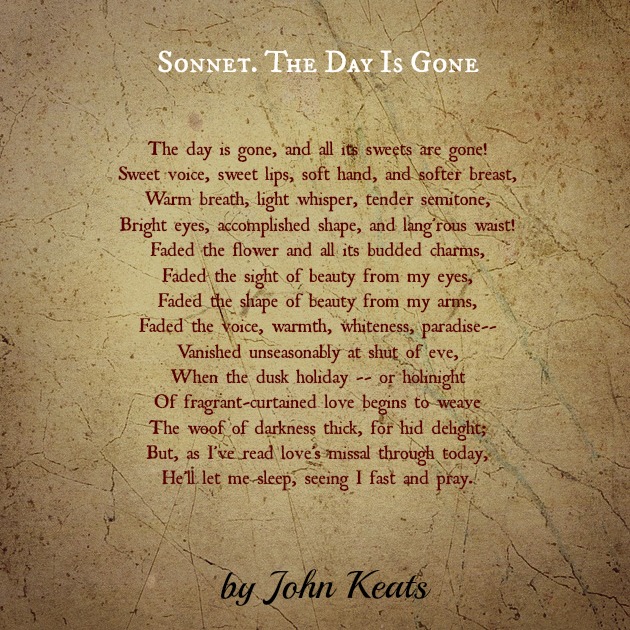
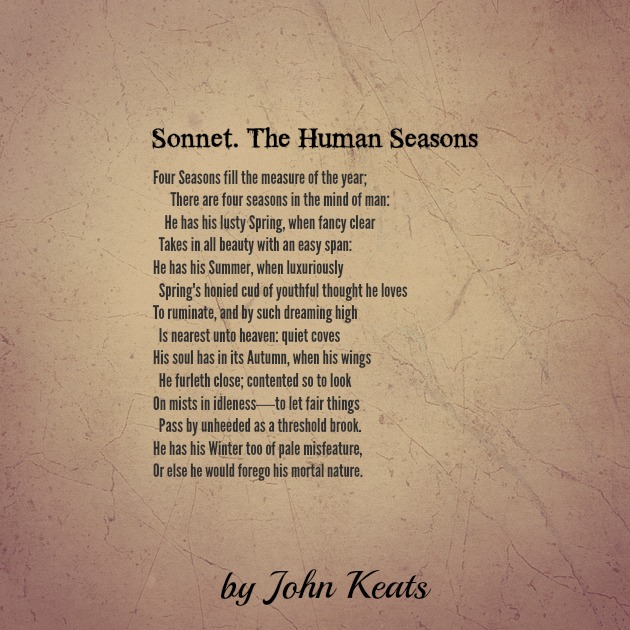
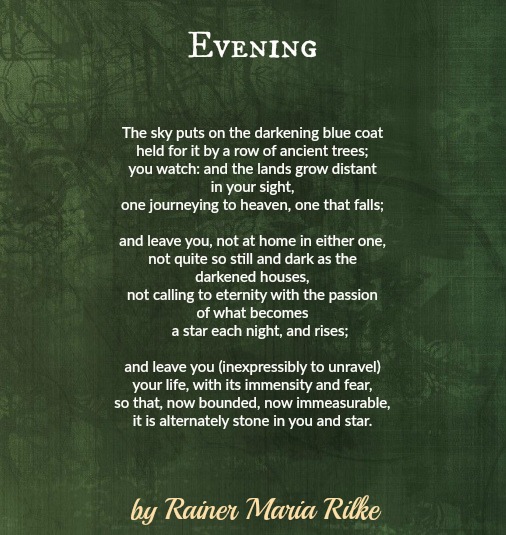
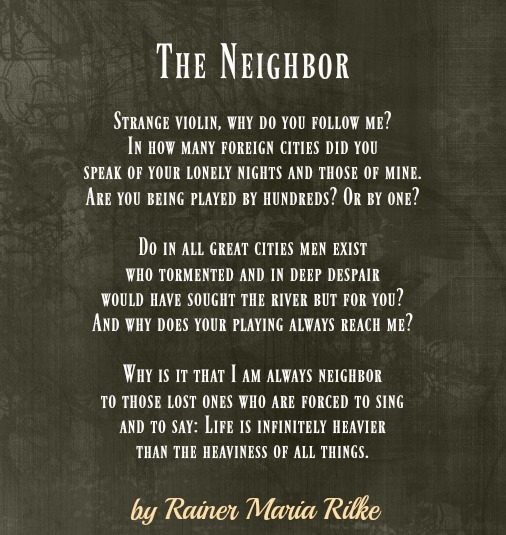
| Elizabeth Elizabeth, it surely is most fit [Logic and common usage so commanding] In thy own book that first thy name be writ, Zeno and other sages notwithstanding; And I have other reasons for so doing Besides my innate love of contradiction; Each poet - if a poet - in pursuing The muses thro' their bowers of Truth or Fiction, Has studied very little of his part, Read nothing, written less - in short's a fool Endued with neither soul, nor sense, nor art, Being ignorant of one important rule, Employed in even the theses of the school- Called - I forget the heathenish Greek name [Called anything, its meaning is the same] "Always write first things uppermost in the heart." by Edgar Allan Poe |
| To
My
Mother Because I feel that, in the Heavens above, The angels, whispering to one another, Can find, among their burning terms of love, None so devotional as that of "Mother," Therefore by that dear name I long have called you- You who are more than mother unto me, And fill my heart of hearts, where Death installed you In setting my Virginia's spirit free. My mother- my own mother, who died early, Was but the mother of myself; but you Are mother to the one I loved so dearly, And thus are dearer than the mother I knew By that infinity with which my wife Was dearer to my soul than its soul-life. by Edgar Allan Poe |
The Bells - A collaboration The bells! — ah, the bells! The little silver bells! How fairy-like a melody there floats From their throats. — From their merry little throats — From the silver, tinkling throats Of the bells, bells, bells — Of the bells! The bells! — ah, the bells! The heavy iron bells! How horrible a monody there floats From their throats — From their deep-toned throats — From their melancholy throats! How I shudder at the notes Of the bells, bells, bells — Of the bells! by Edgar Allan Poe |
| An
Enigma "Seldom we find," says Solomon Don Dunce, "Half an idea in the profoundest sonnet. Through all the flimsy things we see at once As easily as through a Naples bonnet- Trash of all trash!- how can a lady don it? Yet heavier far than your Petrarchan stuff- Owl-downy nonsense that the faintest puff Twirls into trunk-paper the while you con it." And, veritably, Sol is right enough. The general tuckermanities are arrant Bubbles- ephemeral and so transparent- But this is, now- you may depend upon it- Stable, opaque, immortal- all by dint Of the dear names that he concealed within't. by Edgar Allan Poe |
| To
Marie Louise (Shew) Of all who hail thy presence as the morning- Of all to whom thine absence is the night- The blotting utterly from out high heaven The sacred sun- of all who, weeping, bless thee Hourly for hope- for life- ah! above all, For the resurrection of deep-buried faith In Truth- in Virtue- in Humanity- Of all who, on Despair's unhallowed bed Lying down to die, have suddenly arisen At thy soft-murmured words, "Let there be light!" At the soft-murmured words that were fulfilled In the seraphic glancing of thine eyes- Of all who owe thee most- whose gratitude Nearest resembles worship- oh, remember The truest- the most fervently devoted, And think that these weak lines are written by him- By him who, as he pens them, thrills to think His spirit is communing with an angel's. by Edgar Allan Poe |
| Impromptu
- To Kate Carol When from your gems of thought I turn To those pure orbs, your heart to learn, I scarce know which to prize most high — The bright i-dea, or the bright dear-eye. by Edgar Allan Poe |
| Epigram
For Wall Street I'll tell you a plan for gaining wealth, Better than banking, trade or leases — Take a bank note and fold it up, And then you will find your money in creases! This wonderful plan, without danger or loss, Keeps your cash in your hands, where nothing can trouble it; And every time that you fold it across, 'Tis as plain as the light of the day that you double it! by Edgar Allan Poe |
| The
Divine Right Of Kings The only king by right divine Is Ellen King, and were she mine I'd strive for liberty no more, But hug the glorious chains I wore. Her bosom is an ivory throne, Where tyrant virtue reigns alone ; No subject vice dare interfere, To check the power that governs here. O! would she deign to rule my fate, I'd worship Kings and kingly state, And hold this maxim all life long, The King — my King — can do no wrong. by Edgar Allan Poe |
| Sonnet-
Silence There are some qualities- some incorporate things, That have a double life, which thus is made A type of that twin entity which springs From matter and light, evinced in solid and shade. There is a two-fold Silence- sea and shore- Body and soul. One dwells in lonely places, Newly with grass o'ergrown; some solemn graces, Some human memories and tearful lore, Render him terrorless: his name's "No More." He is the corporate Silence: dread him not! No power hath he of evil in himself; But should some urgent fate (untimely lot!) Bring thee to meet his shadow (nameless elf, That haunteth the lone regions where hath trod No foot of man,) commend thyself to God! by Edgar Allan Poe |
| Sonnet-
To Zante Fair isle, that from the fairest of all flowers, Thy gentlest of all gentle names dost take! How many memories of what radiant hours At sight of thee and thine at once awake! How many scenes of what departed bliss! How many thoughts of what entombed hopes! How many visions of a maiden that is No more- no more upon thy verdant slopes! No more! alas, that magical sad sound Transforming all! Thy charms shall please no more- Thy memory no more! Accursed ground Henceforth I hold thy flower-enameled shore, O hyacinthine isle! O purple Zante! "Isola d'oro! Fior di Levante!" by Edgar Allan Poe |
| To
F-- Beloved! amid the earnest woes That crowd around my earthly path- (Drear path, alas! where grows Not even one lonely rose)- My soul at least a solace hath In dreams of thee, and therein knows An Eden of bland repose. And thus thy memory is to me Like some enchanted far-off isle In some tumultuous sea- Some ocean throbbing far and free With storms- but where meanwhile Serenest skies continually Just o'er that one bright island smile. by Edgar Allan Poe |
| To
Frances S. Osgood Thou wouldst be loved?--then let thy heart From its present pathway part not; Being everything which now thou art, Be nothing which thou art not. So with the world thy gentle ways, Thy grace, thy more than beauty, Shall be an endless theme of praise. And love a simple duty. by Edgar Allan Poe |
| Hymn At morn- at noon- at twilight dim- Maria! thou hast heard my hymn! In joy and woe- in good and ill- Mother of God, be with me still! When the hours flew brightly by, And not a cloud obscured the sky, My soul, lest it should truant be, Thy grace did guide to thine and thee; Now, when storms of Fate o'ercast Darkly my Present and my Past, Let my Future radiant shine With sweet hopes of thee and thine! by Edgar Allan Poe |
| Imitation A dark unfathomed tide Of interminable pride - A mystery, and a dream, Should my early life seem; I say that dream was fraught With a wild and waking thought Of beings that have been, Which my spirit hath not seen, Had I let them pass me by, With a dreaming eye! Let none of earth inherit That vision of my spirit; Those thoughts I would control, As a spell upon his soul: For that bright hope at last And that light time have past, And my worldly rest hath gone With a sigh as it passed on: I care not though it perish With a thought I then did cherish by Edgar Allan Poe |
| To
Helen - 1831 Helen, thy beauty is to me Like those Nicean barks of yore, That gently, o'er a perfumed sea, The weary, wayworn wanderer bore To his own native shore. On desperate seas long wont to roam, Thy hyacinth hair, thy classic face, Thy Naiad airs have brought me home To the glory that was Greece And the grandeur that was Rome. Lo! in yon brilliant window-niche How statue-like I see thee stand, The agate lamp within thy hand! Ah, Psyche, from the regions which Are Holy Land! by Edgar Allan Poe |
| Waiting The song I came to sing remains unsung to this day. I have spent my days in stringing and in unstringing my instrument. The time has not come true, the words have not been rightly set; only there is the agony of wishing in my heart….. I have not seen his face, nor have I listened to his voice; only I have heard his gentle footsteps from the road before my house….. But the lamp has not been lit and I cannot ask him into my house; I live in the hope of meeting with him; but this meeting is not yet. by Rabindranath Tagore |
| Freedom Freedom from fear is the freedom I claim for you my motherland! Freedom from the burden of the ages, bending your head, breaking your back, blinding your eyes to the beckoning call of the future; Freedom from the shackles of slumber wherewith you fasten yourself in night's stillness, mistrusting the star that speaks of truth's adventurous paths; freedom from the anarchy of destiny whole sails are weakly yielded to the blind uncertain winds, and the helm to a hand ever rigid and cold as death. Freedom from the insult of dwelling in a puppet's world, where movements are started through brainless wires, repeated through mindless habits, where figures wait with patience and obedience for the master of show, to be stirred into a mimicry of life. by Rabindranath Tagore |
| The
Sun
Of The First Day The sun of the first day Put the question To the new manifestation of life- Who are you? There was no answer. Years passed by. The last sun of the last day Uttered the question on the shore of the western sea In the hush of evening- Who are you? No answer came again. by Rabindranath Tagore |
| Signet
Of Eternity The day was when I did not keep myself in readiness for thee; and entering my heart unbidden even as one of the common crowd, unknown to me, my king, thou didst press the signet of eternity upon many a fleeting moment of my life. And today when by chance I light upon them and see thy signature, I find they have lain scattered in the dust mixed with the memory of joys and sorrows of my trivial days forgotten. Thou didst not turn in contempt from my childish play among dust, and the steps that I heard in my playroom are the same that are echoing from star to star. by Rabindranath Tagore |
| Senses Deliverance is not for me in renunciation. I feel the embrace of freedom in a thousand bonds of delight. Thou ever pourest for me the fresh draught of thy wine of various colours and fragrance, filling this earthen vessel to the brim. My world will light its hundred different lamps with thy flame and place them before the altar of thy temple. No, I will never shut the doors of my senses. The delights of sight and hearing and touch will bear thy delight. Yes, all my illusions will burn into illumination of joy, and all my desires ripen into fruits of love. by Rabindranath Tagore |
| Still
Heart When I give up the helm I know that the time has come for thee to take it. What there is to do will be instantly done. Vain is this struggle. Then take away your hands and silently put up with your defeat, my heart, and think it your good fortune to sit perfectly still where you are placed. These my lamps are blown out at every little puff of wind, and trying to light them I forget all else again and again. But I shall be wise this time and wait in the dark, spreading my mat on the floor; and whenever it is thy pleasure, my lord, come silently and take thy seat here. by Rabindranath Tagore |
| On
The
Nature Of Love The night is black and the forest has no end; a million people thread it in a million ways. We have trysts to keep in the darkness, but where or with whom - of that we are unaware. But we have this faith - that a lifetime's bliss will appear any minute, with a smile upon its lips. Scents, touches, sounds, snatches of songs brush us, pass us, give us delightful shocks. Then peradventure there's a flash of lightning: whomever I see that instant I fall in love with. I call that person and cry: `This life is blest! for your sake such miles have I traversed!' All those others who came close and moved off in the darkness - I don't know if they exist or not. by Rabindranath Tagore |
| The
Kiss Lips' language to lips' ears. Two drinking each other's heart, it seems. Two roving loves who have left home, pilgrims to the confluence of lips. Two waves rise by the law of love to break and die on two sets of lips. Two wild desires craving each other meet at last at the body's limits. Love's writing a song in dainty letters, layers of kiss-calligraphy on lips. Plucking flowers from two sets of lips perhaps to thread them into a chain later. This sweet union of lips is the red marriage-bed of a pair of smiles. by Rabindranath Tagore |
